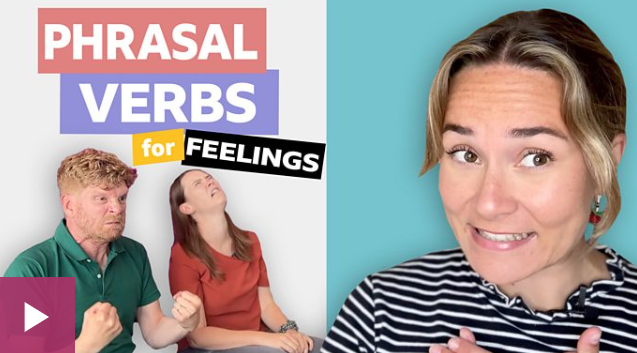Introduction
Georgie teaches you some phrasal verbs that can be used to talk about feelings.
Phrasal verbs mentioned
bottle up (feelings/emotions)
keep feelings hidden and suppressed instead of talking about them
- He tends to bottle up his anger, which often leads to stress.
- Don’t bottle up your emotions; it’s important to talk about how you feel.
open up
share your feelings freely and openly
- After years of keeping everything inside, she finally opened up to her therapist.
- He finds it hard to open up about his past, even to close friends.
hold back/hold (something) back
hesitate or restrain oneself from saying or doing something
- He wanted to tell her the truth, but he decided to hold back.
- She had to hold back her tears during the emotional movie.
- I tried to hold back my laughter during the meeting, but it was impossible.
break down
lose control of your emotions and start crying
- After weeks of stress, he finally broke down and cried.
- She broke down in tears when she heard the sad news.
blow up
lose emotional control in an angry way
- He blew up at his work colleague for making the same mistake again.
- The teacher blew up when the students wouldn’t stop talking.
freak out
lose emotional control (from shock, excitement, fear etc.)
- Don’t freak out, but there’s a spider on your shoulder!
- She freaked out when she saw her favourite popstar on the street.
calm down
return to a state of calmness or relaxation after feeling intense emotions
- After taking a few deep breaths, I started to calm down.
- He needed a few minutes to calm down after the argument.
chill out
relax
- They spent the weekend chilling out by the beach, forgetting about their worries.
- You need to chill out and stop worrying so much about the exam.
TOP TIPS!
- If you see the word ‘something’, it usually means the verb requires an object.
- If ‘something’ is in the middle of the phrasal verb, it means that it can be separated by the object (but doesn’t have to be).
- If ‘something’ is at the end of the phrasal verb, it means it cannot be separated.
- When a pronoun, e.g. him, her, them, is the object of a separable phrasal verb, it must go between the verb and the particle.
